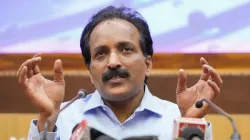ISRO chief highlights the time-consuming nature of space science
ISRO's Space Science and Technology Awareness Training 2025 will begin on January 9 and continue until January 29. Approximately 20,000 students from over 560 institutions will participate.

During a recent virtual event, ISRO chairman S. Somanath emphasized that space science extends beyond the thrill of becoming an astronomer; it is a complex field that requires years of dedicated expertise. He was addressing participants at the launch of the third edition of ISRO's Space Science and Technology Awareness Training (START 2025) programme.
This year, it was reported that around 20,000 students from more than 560 institutions have enrolled for the START programme, which is scheduled to take place from January 9 to 29. While the wonders of the universe often draw attention, Somanath pointed out that space science primarily involves rigorous data analysis and problem-solving in areas like sensor design and the construction of satellites and rockets.
In his speech, he outlined that the programme would cover a wide range of topics, highlighting both ISRO’s exciting space missions and the technicalities of launching and designing rstudenockets, as well as the science behind orbits and trajectories. Somanath advised students to reflect on their own interests and capabilities to determine which area of specialization would be best for them, considering the vast landscape of space science.
He stressed the importance of choosing reputable institutions for higher studies to develop into accomplished space scientists or engineers. Furthermore, Somanath encouraged attendees to maintain an open mind regarding the complexities of space science and not feel discouraged by its challenges.
Referencing advancements in artificial intelligence and machine learning, Somanath noted the potential for significant changes in the future of space science. He expressed hope that participants might one day use AI tools for rocket design or even develop software capable of automated rocket engineering.
Additionally, he highlighted the possibility for students to become successful space technology entrepreneurs or leaders able to unite diverse disciplines to create sophisticated systems. The event was also attended by A. S. Kiran Kumar, a former ISRO chairman and chair of the Apex Science Board at ISRO, who remarked on the goal of the START programme to educate students about opportunities in the space field. He expressed satisfaction that so many young people had participated, noting that for India to make a global impact, substantial involvement within the country is necessary.
ALSO READ: ISRO’s space farming milestone: Cowpea seeds germinate under microgravity in PSLV-C60
Inputs from PTI